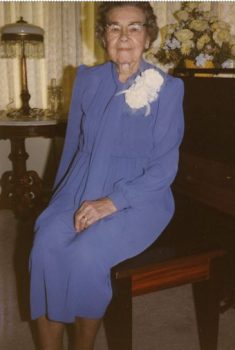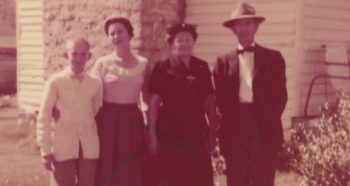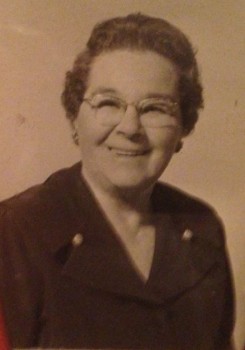In 1958, when my grandmother Hattie Mitchell White became a widow, she “broke up housekeeping” and moved to Lewisburg to live with her daughter Kathryn and son-in-law Edwin Scott. In fact, Edwin built accommodations, a bedroom and bathroom, on the back of his house for her.

Hattie Mitchell White
“Granny” cooked all the meals and did all the laundry for the household. She paid her way and was proud of it. She read the Bible every day and worked on crochet, made quilts, and afghan blankets. She once made a quilt for me out of my old neckties purchased from Pigg and Parsons and W. W. Evans haberdasheries. It’s the loudest dang quilt ever laid out on a bed.
Whenever I went to visit her, I could count on fresh tea cakes in a cookie jar in the kitchen, or Hershey’s “Assorted Miniatures” in the candy bowl in the den, or a new tin of King Leo’s assorted peppermint candy sticks.
When she cooked a meal she would have two or three meats, four or five vegetables and two kinds of bread, and iced tea.
Hattie lived 36 years after moving to Lewisburg. She lacked 33 days being 99 years old when she died. I sure treasure every day and every minute I spent with her.
Among her may fine traits, she was a wonderful storyteller. In fact, she was telling stories until her dying day.
When she was lying on her death bed, I was sitting next to her in the Lewisburg hospital and, as usual in that sort of setting, I was at a complete loss for conversation. But somehow I dredged up a memory that my cousin Tommy Brown had mentioned to me.
My grandmother’s house in the country was near the tracks of the Nashville, Chattanooga, and St. Louis Railway. Tommy Brown once had told me that hoboes would wander by.

Hattie and Bob White (right) with their daughter and grandson — Dee and Tommy Brown. At the homeplace, near the N C & St. L track.
So, I asked my grandmother, “Granny, Tommy Brown told me that hoboes used to come by your house in the country. Did they ever give you any trouble?”
“Oh, they were good people,” she said. “They were just down on their luck.
“They used to come by the front door and knock, then ask for a meal. And I’d say, ‘I tell you what, I’ve got some wood to chop in the backyard. You do that for me and I’ll fry some chicken.’
“You see,” said Granny, “I didn’t want them to feel like they were beggars. I wanted them to feel like they were men, that they had earned what they were getting.”
I looked at her for a moment, still casting about for something else to say, then I guess God put something in my head, because I asked, “Well, how did they know to come to your house?”
She said, “You know Bob and I wondered that ourselves. But one day Bob had just started for Boss Martin’s store and a hobo walked up from the tracks. He came up to Bob and said, ‘Mister, can you please spare a dime?’ and Bob said, ‘Well, I don’t have any money…’ then he rustled around in his coat pocket and drew out a sandwich I’d made and wrapped for him. “…but you can have this.’
“A big smile came to the man’s face. He took the sandwich, thanked Bob, and walked away.
“As Bob was journeyin’ on toward the store, he just happened to turn. It was then he saw the hobo making a mark with his knife on a tree in front of our farm.”
The hobo was saying, “Good folks live here.”
To me this was the most profound story of all the great stories my grandmother told me.
It told me that most of us think we make our own mark in life, but there’s also folks making a mark for us.


